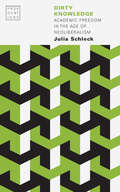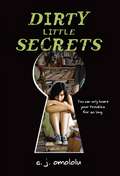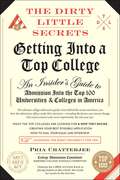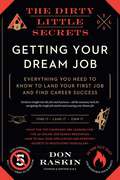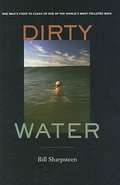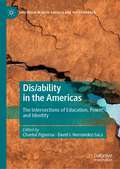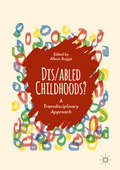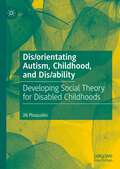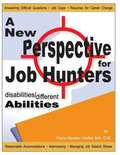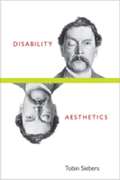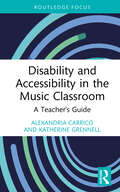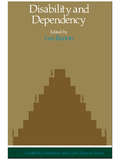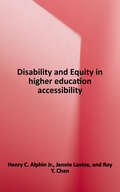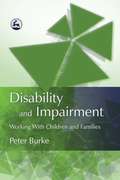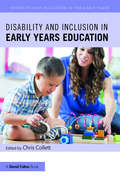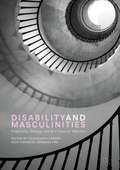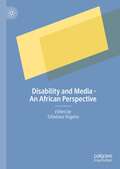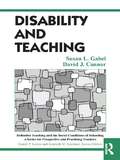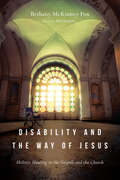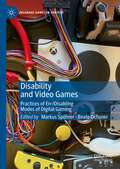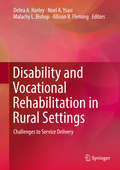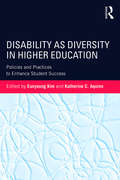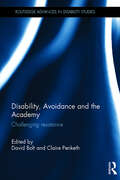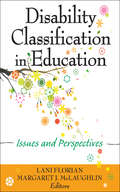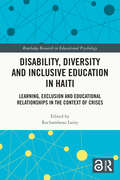- Table View
- List View
Dirty Knowledge: Academic Freedom in the Age of Neoliberalism (Provocations)
by Julia SchleckDirty Knowledge explores the failure of traditional conceptions of academic freedom in the age of neoliberalism. While examining and rejecting the increasing tendency to view academic freedom as a form of free speech, Julia Schleck highlights the problem of basing academic freedom on employment protections like tenure at a time when such protections are being actively eliminated through neoliberalism&’s preference for gig labor. The argument traditionally made for such protections is that they help produce knowledge &“for the public good&” through the protected isolation of the Ivory Tower, where &“pure&” knowledge is sought and disseminated. In contrast, Dirty Knowledge insists that academic knowledge production is and has always been &“dirty,&” deeply involved in the debates of its time and increasingly permeated by outside interests whose financial and material support provides some research programs with significant advantages over others. Schleck argues for a new vision of the university&’s role in society as one of the most important forums for contending views of what exactly constitutes a societal &“good,&” warning that the intellectual monoculture encouraged by neoliberalism poses a serious danger to our collective futures and insisting on deliberate, material support for faculty research and teaching that runs counter to neoliberal values.
Dirty Little Secrets
by C. J. OmololuWhen her unstable mother dies unexpectedly, sixteen-year-old Lucy must take control and find a way to keep the long-held secret of her mother's compulsive hoarding from being revealed to friends, neighbors, and especially the media.
The Dirty Little Secrets of Getting into a Top College
by Pria ChatterjeeA top college admissions insider's exposes the never-before revealed secrets to getting into one of America's elite colleges.Your child is smart. Your child is on the honor roll. Your child aced the SAT. But is it enough to get into a top-tier college? In the Dirty Little Secrets of Getting into a Top College, educational consultant Pria Chatterjee simplifies the complicated process of college admissions, providing parents and students with the tools needed to secure a spot at one of America's most competitive colleges. In the spirit of Kitchen Confidential, Chatterjee gives readers an exclusive look inside the college admissions office--and the mind of a college admissions officer--and exposes just what elite schools look for in a potential student. Through a series of real-world case studies and with a store of deep insider knowledge, Chatterjee will help you navigate the thicket of college admissions and show parents and students what skills and attributes to stress (and what to downplay) when applying to your dream school. * 100% SUCCESS RATE: This is the bullet proof guide to getting into a top college from a consultant with a 100 percent success rate getting her clients into one of America's best universities.* INSIDER KNOWLEDGE: Last year 35,000 students applied to Harvard. Only 6 percent were accepted. Chatterjee, a Harvard alum who interviews potential Harvard students as a member of the university's schools committee, explains that you too can be a member of that elite group. But you must stress the right qualifications.<
The Dirty Little Secrets of Getting Your Dream Job
by Don RaskinDrawing on his extensive experience evaluating applicants for his marketing agency, and featuring stories based on real-life situations, sample cover letters, resumes, and straightforward advice, Don Raskin's The Dirty Little Secrets of Getting Your Dream Job offers all the necessary tools for navigating the tough job market and securing your dream job.Don Raskin owns and operates MME, an advertising and marketing agency in New York City. During his twenty-five years at the agency he has interviewed hundreds of new college graduates for positions within his agency and has placed a strong emphasis on entry-level recruitment for positions in creative, account management, traffic, and production. Raskin has also mentored countless students and their parents on best practices for the job search. Over the years, Raskin has kept exceptionally detailed notes on the interviews he has conducted, observing the good, the bad, the ridiculous, the irreverent. He also has a treasure trove of over-the-top cover letters, resumes, interviews, and post interview follow-ups he has conducted and received. Now, he wants to share all the wisdom and insider secrets he has gathered to help students and first-time job seekers find a job in this economy. Based on his remarkable expertise, Raskin's book provides exclusive insight into the job search process and lets readers in on all of the dirty little secrets to landing their first job--or a new one--and finding career success.
Dirty Water: One Man’s Fight to Clean Up One of the World’s Most Polluted Bays
by Bill SharpsteenDirty Water is the riveting story of how Howard Bennett, a Los Angeles schoolteacher with a gift for outrageous rhetoric, fought pollution in Santa Monica Bay--and won.
Dis/ability in the Americas: The Intersections of Education, Power, and Identity (Education in Latin America and the Caribbean)
by Chantal Figueroa David I. Hernández-SacaThis edited volume highlights the rich and complex educational debates around Critical Disability Studies in Education (DSE), critical mental health, and crip theories. Chapter authors use the term Dis/ability to criticize aspects of education research and international development that do not center the experiences of dis/abled students and people with dis/abilities. Through case studies from around the Americas, chapters highlight how top-down approaches to disabilities further oppress rather than emancipate. The volume prioritizes the spaces of resistance where local initiatives speak back to the demands imposed by an ever-globalizing world shaped by colonialism and imperialism, undergird by intersectional ableism. Voices of disabled students and people with dis/abilities counter-narrate the personal, interpersonal, structural, and political ways in which biomedical and psychological models of disability have impacted their well-being throughout education and society in the Americas. Through a critical sentipensante approach that centers the “epistemologies of the south,” this volume challenges global mental health and dis/ability hegemony in the Americas.
Dis/abled Childhoods?
by Allison BoggisThis edited collection explores the intersectionality of childhood and disability. Whereas available scholarship tends to concentrate on care-giving, parenting, or supporting and teaching children and young people with special educational needs and disabilities, the contributors to this collection offer an engaging and accessible insight into childhoods that are impacted by disability and impairment. The discussions cut across traditional disciplinary divides and offer critical insights into the key issues that relate to disabled children and young people's lives, encouraging the exploration of both disability and childhoods in their broadest terms. Dis/abled Childhoods? will be of interest to students and scholars across a range of disciplines including Special Educational Needs; Childhood Studies; Disability Studies; Youth Studies; and Health and Social Care.
Dis/orientating Autism, Childhood, and Dis/ability: Developing Social Theory for Disabled Childhoods
by Jill PluquailecThis book considers the many ways autistic lives have been dominantly storied historically, politically, socially, and culturally. Using a range of transdisciplinary theory, the author develops a theoretically rich approach termed ‘dis/orientation’, which breaks new ground for autism research’s understanding of everyday life, and everyday childhoods. The book uses stories of everyday life to provoke new analyses of what it means to talk about, live with, and become, an autistic child: these stories of schooling and education highlight what is done to autistic bodies, what is done by these bodies, and what becomes between them. This offers a way in to the theoretical work of dis/orientation; a practice and an ethic, that means remaining ever watchful for single orientations towards (and away from) autism and childhood, and the children living those childhoods. This leads to new disciplinary grounds, a reconceptualisation of the terrains of research and practice, not of the disordered and disembodied autistic mind, but of the embodied, lived, and everyday.
Disabilities/Different Abilities
by Paula Reuben VieilletThis is a hands-on workbook which will help the job hunter who has a disability secure employment. Step by step, this manual guides the job hunter through the vocational process in an honest and positive manner so as to get results. It is designed for individual usage, or in conjunction with a trained professional. The first section, Getting to Know You, addresses self-esteem, personal values and job goal definition and includes motivational strategy. The second section, Facing Workplace Discrimination, reviews application and interviewing functions with a focus on eliminating discrimination in the hiring process. Typical concerns of job hunters are answered in a straightforward and informative manner. The third section, Ready, Set, Go, deals with feelings and concerns regarding returning to work and includes a handy reference guide of available resources for job hunters with disabilities.
Disability Aesthetics
by Tobin SiebersDisability Aesthetics ambitiously redefines both 'disability' and 'aesthetics,' showing us that disability is central not only to modern art but also to the way we apprehend (and interact with) bodies and buildings. Along the way, Tobin Siebers revisits the beautiful and the sublime, 'degenerate' art and 'disqualified' bodies, culture wars and condemned neighborhoods, the art of Marc Quinn and the fiction of Junot Díaz---and much, much more. Disability Aesthetics is a stunning achievement, a must-read for anyone interested in how to understand the world we half create and half perceive." ---Michael Bérubé, Paterno Family Professor in Literature, Pennsylvania State University. "Rich with examples of the disabled body in both historical and modern art, Tobin Siebers's new book explores how disability problematizes commonly accepted ideas about aesthetics and beauty. For Siebers, disability is not a pejorative condition as much as it is a form of embodied difference. He is as comfortable discussing the Venus de Milo as he is discussing Andy Warhol. Disability Aesthetics is a prescient and much-needed contribution to visual & critical studies." ---Joseph Grigely, Professor of Visual and Critical Studies, The School of the Art Institute of Chicago. Disability Aesthetics is the first attempt to theorize the representation of disability in modern art and visual culture. It claims that the modern in art is perceived as disability, and that disability is evolving into an aesthetic value in itself. It argues that the essential arguments at the heart of the American culture wars in the late twentieth century involved the rejection of disability both by targeting certain artworks as "sick" and by characterizing these artworks as representative of a sick culture. The book also tracks the seminal role of National Socialism in perceiving the powerful connection between modern art and disability. It probes a variety of central aesthetic questions, producing a new understanding of art vandalism, an argument about the centrality of wounded bodies to global communication, and a systematic reading of the use put to aesthetics to justify the oppression of disabled people. In this richly illustrated and accessibly written book, Tobin Siebers masterfully demonstrates the crucial roles that the disabled mind and disabled body have played in the evolution of modern aesthetics, unveiling disability as a unique resource discovered by modern art and then embraced by it as a defining concept. Tobin Siebers is V. L. Parrington Collegiate Professor of English Language and Literature and Art and Design at the University of Michigan. His many books include Disability Theory and The Subject and Other Subjects: On Ethical, Aesthetic, and Political Identity. A volume in the series Corporealities: Discourses of Disability.
Disability and Accessibility in the Music Classroom: A Teacher's Guide (Modern Musicology and the College Classroom)
by Alexandria Carrico Katherine GrennellDisability and Accessibility in the Music Classroom provides college music history instructors with a concise guide on how to create an accessible and inclusive classroom environment. In addition to providing a concise overview of disability studies, highlighting definitions, theories, and national and international policies related to disability, this book offers practical applications for implementing accessibility measures in the music history classroom. The latter half of this text provides case studies of well-known disabled composers and musicians from the Western Art Music canon from the Middle Ages to the Twentieth Century as well as popular music genres, such as the blues, jazz, R&B, pop, country, and hip hop. These examples provide opportunities to integrate discussions of disability into a standard music history curriculum.
Disability And Dependency (Disability, Handicap And Life Chances Ser. #Vol. 5)
by Len BartonFirst published in 1989. Routledge is an imprint of Taylor & Francis, an informa company.
Disability and Equity in Higher Education Accessibility (Advances In Educational Marketing, Administration, And Leadership Ser.)
by Henry C. Alphin Jennie Lavine Roy Y. ChanEducation is the foundation of almost all successful lives. It is vital that learning opportunities are available on a global scale, regardless of individual disabilities or differences, and to create more inclusive educational practices. Disability and Equity in Higher Education Accessibility is a comprehensive reference source for the latest scholarly material on emerging methods and trends in disseminating knowledge in higher education, despite traditional hindrances. Featuring extensive coverage on relevant topics such as higher education policies, electronic resources, and inclusion barriers, this publication is ideally designed for educators, academics, students, and researchers interested in expanding their knowledge of disability-inclusive global education.
Disability and Impairment: Working with Children and Families
by Peter BurkeDisability and Impairment introduces professionals working with families to the everyday issues faced by disabled people of all ages in family life. Peter C Burke shows how social attitudes shape the world of the 'disabled family' either positively or negatively and the effects of stigma. He demonstrates the normality of disability - that children are children whatever their label - and the need for a sensitive professional understanding of the impact of both physical and learning disabilities on family members, in order to improve their quality of life. This book covers the spectrum of disability issues, and offers information and advice for professionals working with families and disability, explaining the value of family support, how to validate the feelings of siblings with disabled brothers and sisters, tackling social exclusion and understanding the role of lifelong professional help. Case studies and practice notes make this an accessible reference for social work students and practitioners.
Disability and Inclusion in Early Years Education (Diversity and Inclusion in the Early Years)
by Chris CollettDisability and Inclusion in Early Years Education supports practitioners in understanding and implementing inclusive practice relating to disability in early years education. Offering a detailed explanation of recent developments in the field, such as the 2015 SEND Code of Practice, it provides straightforward and accessible guidance on implementing the crucial procedures that help to promote good practice. More broadly, the book provides guidance on creating a fully inclusive early years environment that will support all children, focusing on high-incidence needs around communication, behaviour and learning. Chapters offer a wealth of practical tools and strategies to support the inclusion of children with disabilities more effectively, covering key topics such as: assessment, early identification and individualised learning working with parents, carers and families the key role of picture books multisensory approaches to learning supporting behaviour and communication This text will be valuable reading for all early years practitioners and students who want to promote the inclusion of children with SEND in mainstream provisions.
Disability and Masculinities
by Cassandra Loeser Vicki Crowley Barbara PiniIn recent years, attending to diversity in the cultivation of embodied identity has been given additional impetus as a result of intersectionality theory. Despite this, a key gap remains in terms of knowledge about masculinity and disability. This book addresses this lacuna through ten empirical chapters organised through the inter-related themes of corporeality, pedagogy and the critique of otherness. Each of the chapters positions the subject of masculinity and disability as a site of cultural pedagogy by affirming different ways of knowing of masculinity beyond dominant ideologies that normalise a particular masculine body and relegate disabled masculinities to the position of abnormal 'Other'. Part One focuses on pedagogy. Through the materialities of 'medicalized colonialism', imprimaturs of 'relational genealogies', 'compounding differences' and an analytical exposition of some of the neo-colonial conditions of the Global South within spatially-considered places of the Global North, Chapter 1 examines the denial of human rights to the Indigenous Anishinaabe community of Shoal Lake 40 in Canada. Chapter 1 theorises masculine corporeality in terms that take seriously First Nations', national and transnational body politics seriously. Chapter 2 examines the ways that movement and affect serve as a form of pedagogy for boys with autism spectrum in schools. Part Two's focus on corporeality includes an examination of the nexus of disability and diagnosis in the context of transgender men's experiences of mental health, and a discussion of the ways that intersex individuals who identify as men and have experienced 'genital normalising surgery' actively negotiate pluralised masculinities. The focus on media in Part Three encompasses a study of the mis-interpellation of the disabled male subject in Australian male literature, research on the discursive strategies utilised in media representations of disabled veterans in Turkey, and an analysis of the political implications of depictions of masculinity, disability and sexualities in a variety television program. Part Four's theme of self-stylisation takes up the questions of men's reconstructions of masculinity in light of Lyme Disease, the potential pleasures of heterosexuality for young men with a hearing disability in the realm of Australian-Rules Football, and the diverse ways that disabled men negotiate patriarchal masculinity in intimate relationships.
Disability and Media - An African Perspective
by Tafadzwa RugohoThis book seeks to expand some of the existing, often western and Global North facing, scholarship in the area of Disability and Media Studies to include African perspectives. Featuring predominantly Africa-based contributors, it studies an array of topics on disability and media in Africa, including issues of social media, media ethics, including marginalised voices in the media, and disability representation in the media.
Disability and Teaching (Reflective Teaching and the Social Conditions of Schooling Series)
by David Connor Susan GabelDisability and Teaching highlights issues of disability in K-12 schooling faced by teachers, whoare increasingly accountable for the achievement of all students regardless of the labelsassigned to them. It is designed to engage prospective and practicing teachers in examining theirpersonal theories and beliefs about disability and education. Part I offers four case studies dealing with issues such as inclusion, over-representation inspecial education, teacher assumptions and biases, and the struggles of novice teachers. Thesecases illustrate the need to understand disability and teaching within the contexts of school,community, and the broader society and in relation to other contemporary issues facing teachers.Each is followed by space for readers to write their own reactions and reflections, educators’dialogue about the case, space for readers’ reactions to the educators’ dialogue, a summary, andadditional questions. Part II presents public arguments representing different views about thetopic: conservative, liberal-progressive, and disability centered. Part III situates the authors’personal views within the growing field of Disability Studies in education and provides exercisesfor further reflection and a list of resources. Disability and Teaching is the 8th volume in the Reflective Teaching and the Social Conditions ofSchooling Series, edited by Daniel P. Liston and Kenneth M. Zeichner. This series of small,accessible, interactive texts introduces the notion of teacher reflection and develops it in relationto the social conditions of schooling. Each text focuses on a specific issue or content area inrelation to teaching and follows the same format. Books in this series are appropriate for teachereducation courses across the curriculum.
Disability and the Way of Jesus: Holistic Healing in the Gospels and the Church
by Bethany McKinney FoxWhat does healing mean for people with disabilities? The Gospels are filled with accounts of Jesus offering physical healing. But even as churches today seek to follow the way of Jesus, people with disabilities all too often experience the very opposite of healing and life-giving community: exclusion, judgment, barriers. Misinterpretation and misapplication of biblical healing narratives can do great damage, yet those who take the Bible seriously mustn't avoid these passages either. Bethany McKinney Fox believes that Christian communities are better off when people with disabilities are an integral part of our common life. In Disability and the Way of Jesus, she considers how the stories of Jesus' healings can guide us toward mutual thriving. How did Jesus' original audience understand his works of healing, and how should we relate to these texts today? After examining the healing narratives in their biblical and cultural contexts, Fox considers perspectives from medical doctors, disability scholars, and pastors to more fully understand what Jesus does as he heals and how he points the way for relationships with people with disabilities. Personal reflections from Christians with disabilities are featured throughout the book, which concludes with suggestions for concrete practices adaptable to a variety of church settings. Bridging biblical studies, ethics, and disability studies with the work of practitioners, Fox provides a unique resource that is both theologically grounded and winsomely practical. Disability and the Way of Jesus provides new lenses on holistic healing for scholars, laypeople, and ministry leaders who care about welcoming all people as Jesus would.
Disability and Video Games: Practices of En-/Disabling Modes of Digital Gaming (Palgrave Games in Context)
by Markus Spöhrer Beate OchsnerThis collection intends to fill a long overdue research gap on the praxeological aspects of the relationships between disabilities, accessibility, and digital gaming. It will focus on the question of how Game Studies can profit from a Disability Studies perspective of en-/disabling gaming and issues of disability, (in)accessibility and ableism, and vice versa. Instead of departing from the medical model of disability that informs a wide range of publications on “disabled” gaming and that preconceives users as either “able-bodied,” “normal” or as “disabled,” “deficit,” or “unable to play,” our central premise is that dis/ability is not an essential characteristic of the playing subject. We rather intend to analyze the complex infrastructures of playing, i.e., the complex interplay of heterogeneous human and non-human actors, that are en- or disabling.
Disability and Vocational Rehabilitation in Rural Settings
by Debra A. Harley Noel A. Ysasi Malachy L. Bishop Allison R. FlemingThis first-of-its-kind textbook surveys rehabilitation and vocational programs aiding persons with disabilities in remote and developing areas in the U. S. and abroad. Contributors discuss longstanding challenges to these communities, most notably economic and environmental obstacles and ongoing barriers to service delivery, as well as their resilience and strengths. Intersections of health, social, structural, and access disparities are shown affecting rural disabled populations such as women, racial and sexual minorities, youth, and elders. In terms of responses, a comprehensive array of healthcare and health policy solutions and recommendations is critiqued with regard to health, employment, and service effectiveness outcomes. Included among the topics: Healthcare initiatives, strategies, and challenges for people with disabilities in rural, frontier, and territory settings. Challenges faced by veterans residing in rural communities. The Asia and Pacific region: rural-urban impact on disability. Challenges after natural disaster for rural residents with disabilities. Meeting the needs of rural adults with mental illness and dual diagnoses. Capacity building in rural communities through community-based collaborative partnerships. Disability and Vocational Rehabilitation in Rural Settings makes a worthy textbook for graduate students and upper-level undergraduates in the fields of social work, community and environmental psychology, public health, sociology, education, and geography. Its professional audience also includes vocational rehabilitation counselors serving these dynamic populations.
Disability as Diversity in Higher Education: Policies and Practices to Enhance Student Success
by Eunyoung Kim Katherine C. AquinoAddressing disability not as a form of student impairment—as it is typically perceived at the postsecondary level—but rather as an important dimension of student diversity and identity, this book explores how disability can be more effectively incorporated into college environments. Chapters propose new perspectives, empirical research, and case studies to provide the necessary foundation for understanding the role of disability within campus climate and integrating students with disabilities into academic and social settings. Contextualizing disability through the lens of intersectionality, Disability as Diversity in Higher Education illustrates how higher education institutions can use policies and practices to enhance inclusion and student success.
Disability, Avoidance and the Academy: Challenging Resistance (Routledge Advances in Disability Studies)
by David Bolt Claire PenkethDisability is a widespread phenomenon, indeed a potentially universal one as life expectancies rise. Within the academic world, it has relevance for all disciplines yet is often dismissed as a niche market or someone else’s domain. This collection explores how academic avoidance of disability studies and disability theory is indicative of social prejudice and highlights, conversely, how the academy can and does engage with disability studies. This innovative book brings together work in the humanities and the social sciences, and draws on the riches of cultural diversity to challenge institutional and disciplinary avoidance. Divided into three parts, the first looks at how educational institutions and systems implicitly uphold double standards, which can result in negative experiences for staff and students who are disabled. The second part explores how disability studies informs and improves a number of academic disciplines, from social work to performance arts. The final part shows how more diverse cultural engagement offers a way forward for the academy, demonstrating ways in which we can make more explicit the interdisciplinary significance of disability studies – and, by extension, disability theory, activism, experience, and culture. Disability, Avoidance and the Academy: Challenging Resistance will interest students and scholars of disability studies, education studies and cultural studies.
Disability Classification in Education: Issues and Perspectives
by Margaret J. McLaughlin Lani FlorianThis edited volume examines current disability classification systems, the dilemmas educators face in categorizing students with special needs, and alternative options based on recent challenges and trends.
Disability, Diversity and Inclusive Education in Haiti: Learning, Exclusion and Educational Relationships in the Context of Crises (Routledge Research in Educational Psychology)
by Rochambeau LainyThis book examines disability, diversity, and schooling exclusion in Haiti in the wake of Hurricane Matthew. Defending a social and anthropological conception of disability as a consequence of any situation that makes a subject uncomfortable and unable to live or act properly, the book explores the difficulties that disabled children face within the school system and considers how social exclusion provokes and exacerbates educational exclusion. With contributions from linguists, educational sociologists, educational psychologists, educators, and historians, the chapters focus on a range of phenomena such as the balance of languages used for teaching, gender equity, associated disorders, and the experiences of left-handed and deaf students. Ultimately, the authors demonstrate how the educational relationships built and practiced in school influence the perceptions of people with disabilities, with respect to both singular contexts and pedagogical practices. As such, it represents an important study of the relationship between school exclusion, disability, and those with precarious socio-familial conditions, and how they can be conceptualized and addressed in the context of crises. It will appeal to scholars, researchers, and academics with interests in diversity and inclusive education, pedagogy, crisis education, and educational psychology. Chapters 1, 3, 7, and 8 of this book are available for free in PDF format as Open Access from the individual product page at www.routledge.com. They have been made available under a Creative Commons Attribution-Non Commercial-No Derivatives 4.0 license.
